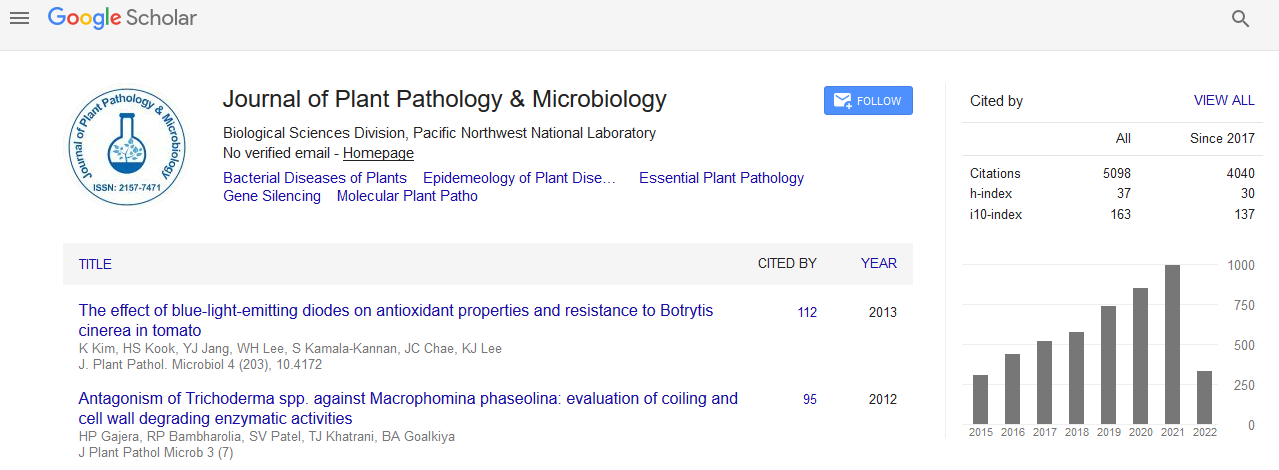PMC/PubMed Indexed Articles
Indexed In
- Open J Gate
- Genamics JournalSeek
- Academic Keys
- JournalTOCs
- CiteFactor
- Ulrich's Periodicals Directory
- Access to Global Online Research in Agriculture (AGORA)
- Electronic Journals Library
- Centre for Agriculture and Biosciences International (CABI)
- RefSeek
- Directory of Research Journal Indexing (DRJI)
- Hamdard University
- EBSCO A-Z
- OCLC- WorldCat
- Scholarsteer
- SWB online catalog
- Virtual Library of Biology (vifabio)
- Publons
- Geneva Foundation for Medical Education and Research
- Euro Pub
- Google Scholar
Useful Links
Share This Page
Journal Flyer

Open Access Journals
- Agri and Aquaculture
- Biochemistry
- Bioinformatics & Systems Biology
- Business & Management
- Chemistry
- Clinical Sciences
- Engineering
- Food & Nutrition
- General Science
- Genetics & Molecular Biology
- Immunology & Microbiology
- Medical Sciences
- Neuroscience & Psychology
- Nursing & Health Care
- Pharmaceutical Sciences
Phytomelatonin: Improving hardiness, stress tolerance and crop production
International Conference on Plant Physiology & Pathology
June 09-10, 2016 Dallas, USA
Russel J Reiter
UT Health Science Center, USA
Keynote: J Plant Pathol Microbiol
Abstract:
Melatonin, an ancient molecule and well known animal hormone which was recently discovered in plants, has numerous beneficial actions in economically-important plant species. Melatonin is a tryptophan derivative which has been identified in all plant species investigated. The concentration of melatonin in plants varies widely depending on stage of maturation, plant organ in which it is measured, plant species and previous stress exposure of the plant. Since they are sessile, plants are subjected to more abiotic and biotic stressors than are animals. Like a number of other small molecules, e.g., polyamines, melatonin increases plant tolerance to a variety of abiotic stresses including salinity, drought, excessive water, heat, cold, freezing, ultraviolet radiation, excessive light and heavy metal toxicity. When exposed to any of these stresses, plants upregulate endogenous melatonin synthesis thereby improving their tolerance to environmental insults. Likewise, melatonin added to the growth medium is taken up by the root systems to improve plant hardiness. Melatonin also protects apple leaves from a biotic stress (Marssonina fungus). Melatonin promotes chlorophyll synthesis in sprouting plants and inhibits chlorophyll degradation during light deprivation. It also helps to maintain ion homeostasis and inhibit senescence-associated genes. When melatonin was added to the seed coating solution used for soybeans, the subsequent growth of the plants was improved (taller plants and larger leaves) and soybean yield (number of pods and number of seeds) was improved. High throughput RNA sequence analysis showed treatment of Bermuda grass with melatonin upregulated 2,361 genes while down regulating 1,572 genes.
Biography :
Russel J Reiter, PhD, is a Professor of Cell Biology at the UT Health Science Center in San Antonio, Texas. He has been awarded 3 honorary MD degrees and 1 honorary DSc Degree. He has received numerous awards for his research including the A Ross McIntyre Gold Medal (USA), US Senior Scientist Award (Germany), Lezoni Lincee Award (Italy), the Inaugural Aaron B Lerner Award (FASEB, USA), etc. His scientific publications have been cited in excess of 90,000 times (Google Scholar) and his h-index is 145. He is on Thomson Reuters List of Highly Cited Scientists (top 100 in his field).
Email: reiter@uthscsa.edu


